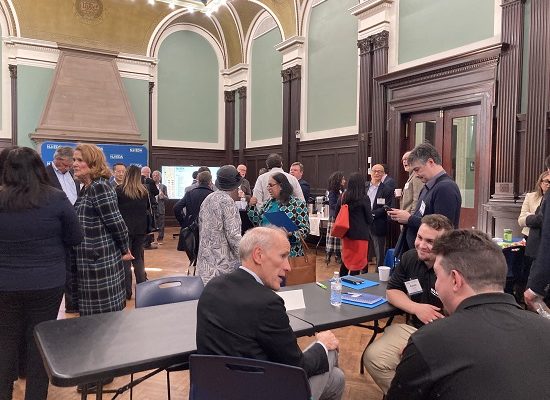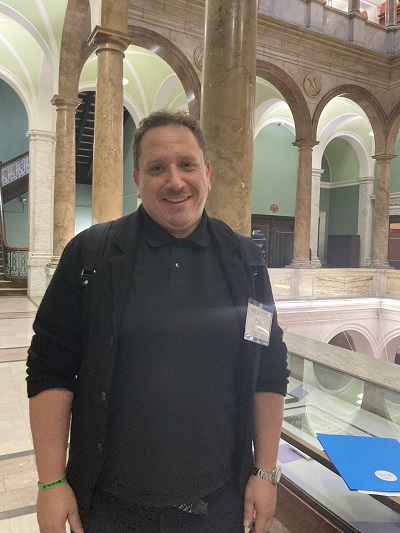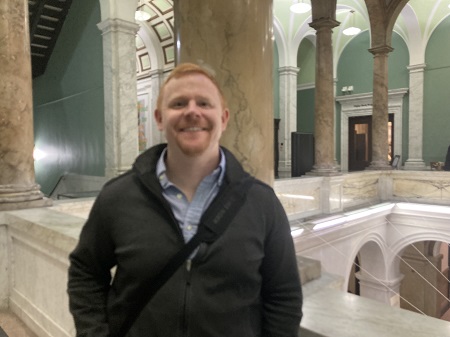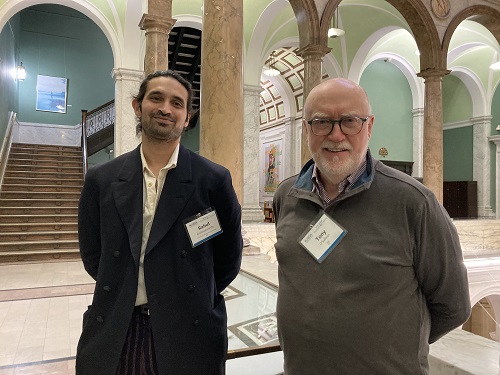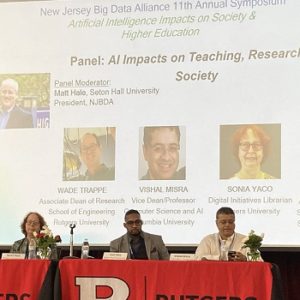Founders Meet Investors at NJEDA Event, Part 3
Twice a year, the New Jersey Economic Development Authority (NJEDA) holds its Founders & Funders event, where the state’s startup founders are introduced to potential investors. We’ve written about this November’s event in two previous stories, here and here.
According to statistics from the NJEDA, November’s Founders & Funders had 23 investors in attendance, with 74 percent of them categorized as VCs, 4 percent corporate VCs, and 22 percent angel investors. Thirty percent of the investors were emerging fund managers.
Some 35 startup companies attended, with 43 percent of them in technology, 35 percent in life sciences, 14 percent in finance and professional services, 3 percent in advanced manufacturing and 5 percent in clean energy.
Also, some 34 percent of the companies were women-led, and an overwhelming majority were led by diverse founders, including women. The NJEDA noted that 247 total meetings took place, and on average the founders reported that they had five or six follow-up conversations with investors they had met at the event.
Paul Thorogood, founder and CEO of Kaleidoscope | Esther Surden
Paul Thorogood of Kaleidoscope
Paul Thorogood, founder and CEO of Kaleidoscope (Jersey City), spoke to us after having six meetings with investors. Kaleidoscope is a collaboration platform that enables artists and brands to share their work through AI.
“We’ve basically created an AI apprentice that helps consumers collaborate with [art]work, and it’s safe. We’re not scraping the whole world. We are training on artists brands individually.”
Thorogood explained that “it’s really hard for brands and artists to allow their work to be customized” to better meet consumers’ needs. Kaleidoscope solves that problem for Gen Z consumers who are looking to customize products for themselves.
Another problem the company solves, he said, revolves around how generative AI is currently taking images from everywhere. “So, you’re losing value in terms of art. What we’re doing is creating a closed system where artists can use their own work, or brands can use their own work, to actually share with the consumer, but to be authenticated, protected and just easy to use.”
We asked Thorogood about his meetings with investors. “They went really well,” he said. “We’ve had two no-shows, but we’ve had six pitches, so that’s a positive. We’ve had very positive feedback, and hopefully, we are going to be sending out a few decks to a few people later. It’s been an interesting day in terms of the tech, to meet a lot of different people, a lot of different investor types.”
Asked about advice from the investors, Thorogood mentioned that one gave him great advice about using the event for relationship building. “We were discussing the fact that what might not work out now could work out later. This was a good insight, that the meetings should not just be transactional. You don’t know where, in your journey as a founder, people may come back into your life.”
Edwin Handschuh, cofounder and CEO of 1Konto | Esther Surden
Edwin Handschuh of 1Konto
Towards the end of the meeting, we spoke to Edwin Handschuh, cofounder and CEO of 1Konto (Jersey City), a fintech company devoted to trading and digital-trading infrastructure. “1Konto is a best-price execution service and liquidity provider in digital assets and FX [foreign exchange]. We operate a platform called ‘1KPrime,’ which provides OTC [over-the-counter], API and WebApp trading to institutional counterparties. We are currently raising capital for IDX, our off-exchange settlement service, which eliminates counterparty risk while increasing capital efficiency,” Handschuh said.
What sets the company apart, he noted, is “our ability to pair Bitcoin, stablecoins, and non-USD currencies. We are seeing broad and strong growth outside the U.S., as well as inside. Outside the U.S., growth is from the U.K., Europe, as well as the APAC [Asia-Pacific] area.”
Handschuh said that he had met with several investors, and that the meetings had gone well, with further conversations coming out of them. He told us that he received some good advice, and in meetings with firms that “we were too far along for,” his interviewers offered to make introductions to appropriate investors. Also, some investors gave him insights on how to position the company for fund-raising.
Rahul Krishnamoorthy (L) and Tony O’Sullivan of IBIS | Esther Surden
Tony O’ Sullivan and Rahul Krishnamoorthy of IBIS
Impact Business Information Solutions (IBIS) is a software solution provider for the life- and health-science industries, based in Princeton. We spoke with Tony O’Sullivan, founder and CEO, and to Rahul Krishnamoorthy, cofounder. Funded by the National Cancer Institute, part of the National Institutes of Health, the company “removes patient information from medical images, using AI. Currently, it’s a manual process that’s very expensive,” O’Sullivan said. The removal of patient information is required for any data to be made public alongside research, he said. This is also a big problem for pharma when running clinical trials. “If you are a hospital and you are looking to facilitate more research, you need a big corpus of de-identified data. This is especially difficult in brain imaging. … We use natural language processing, computer vision and deep learning to automate that process.”
The second solution that ISIS is working on concerns diagnostic algorithms for medical imaging. There are algorithms that gauge how a patient has responded to treatment or how a disease (such as tuberculosis) is progressing. However, “if I am a hospital group, and I now want to connect all my data to this, so that every patient that comes in with tuberculosis gets analyzed by this algorithm, that’s really hard,”O’Sullivan said.
The founders said that the investors they talked to were receptive to their ideas and gave them some advice. In fact, the very first investor they talked to suggested that they connect the dots better between their pitch, what they do and how they make money. “So, the second time around, we took that feedback, and I think the meeting went better,” said O’Sullivan. “He [the investor in the second meeting] directly asked us for a follow-up, and we’ll see where that goes.”

